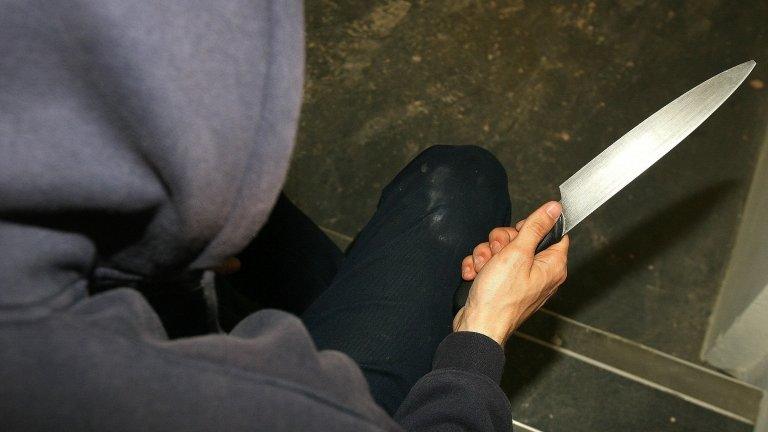David Blunkett 'regrets injustices' of indeterminate sentences
- Published
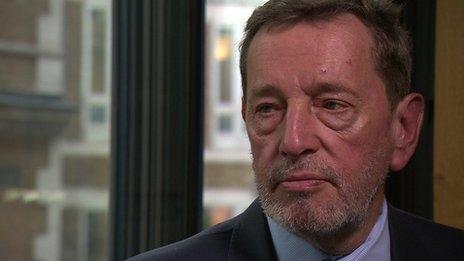
David Blunkett said Labour had not put enough resources in to support IPP
Ex-home secretary David Blunkett has expressed "regret" that indeterminate jail terms, brought in while he was in office, have led to "injustices".
The Criminal Justice Act of 2003 introduced Indeterminate Sentencing for Public Protection or IPP, designed for serious sexual and violent offenders in England and Wales.
But IPP numbers mushroomed, with many in jail well past their minimum terms.
Mr Blunkett said the Labour government had "got the implementation wrong".
When it was introduced, the government estimated that IPP would lead to 900 extra offenders entering the prison system.
But the measure was applied far more widely and by 2012 - when IPP was scrapped, but not in existing cases - there were more than 6,000 IPP prisoners.
IPP prisoners were given tariffs or minimum sentences, at the end of which the Parole Board assesses whether they are still a danger to the public or ready for release.
IPP is supposed to reduce the risk posed by inmates by enabling them to attend behaviour management courses.
'Nine-year backlog'
But waiting lists for both the courses and parole hearings mean that even though IPP has now been abolished, more than 5,500 IPP prisoners remain within the system, with nearly two-thirds over their tariff.
At the current release rate of about 400 a year, it will take nine years to clear the backlog of those over their tariff.
Mr Blunkett, who was home secretary from 2001 to 2004, told BBC Newsnight that while he believed the legislation had been "necessary to safeguard the public", he "very much regrets" that the government was not clearer in setting out sentencing criteria for judges.
Zoe Conway meets some of those affected by IPP
He added it had not been "effective enough" in putting in the necessary resources to ensure rehabilitation courses were available.
"We certainly got the implementation wrong. The consequence of bringing that Act in has led, in some cases, to an injustice and I regret that," he said.
The family of Richard Huxley believes he is one such case.
He was imprisoned aged 18 for assault and attempted robbery and given an IPP with a 17-month tariff.
More than eight years later, he is still in prison.
His mother, Wendy Huxley, from Ellesmere Port, near Liverpool, said: "He's lost so many years, it's wrong. He's in there and forgotten about, basically."
Richard's behaviour inside has not always been perfect - three years ago he failed a drugs test - but his family argues that in eight years he has not been violent.
In two weeks' time he will get his next parole hearing. The most he can hope for, say his lawyers, is a move to an open prison, where he is likely to stay for between 12 and 18 months.
His family fear what he might do if that move does not go ahead, as he has attempted suicide several times.
'Mental health risk'
IPP prisoners appear to be at a significantly higher risk of mental health problems than other prisoners, according to the Centre for Mental Health.
In a study it carried out in 2008, it found that one in 10 IPP prisoners were seeking psychiatric help in prison, double the rate in the general prison population.
Donna Ridgely, whose 30-year-old brother Shaun Beasley killed himself after three years in prison, said the lack of a release date had made him feel hopeless.
''I know Shaun done bad things... but if he had a date when he would have been coming out, he could have lived with a little bit of hope.''
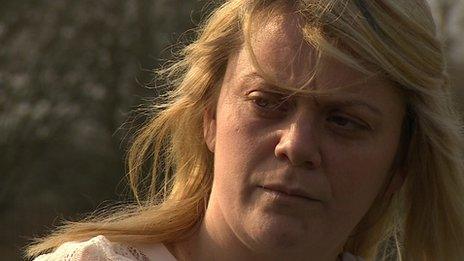
Donna Ridgely was the last person to speak to her brother before he died
Donna said Shaun, a recovering drug addict, had had serious mental health issues.
He went to prison with a tariff of two years and five months after forcing someone to take money out of a cash machine.
He had been told he needed to go on a drug rehabilitation course and was transferred to another prison to do it, but once there, he found it was not available.
This is what tipped him over the edge, said Donna. ''He rang me in the morning [of his death] and he just said 'you know I love you all... look after my mum. I just can't take no more, Donna, I don't know what's happening with my life'.''
IPP sentences were abolished in 2012 by then justice secretary Ken Clarke, who called them a "stain" on the criminal justice system.
He said it was "almost impossible" for a prisoner to prove that he was no longer a risk to the public.
'Running on empty'
Former IPP prisoner Shaun Lloyd, who was released three weeks ago, is campaigning on behalf of other IPP prisoners.
He was given a tariff of two years and nine months for two street robberies when he was 18, but spent more than eight years in prison.
He fears for some of the IPP prisoners he has left behind: ''They're running on empty. I don't know whether I am going to get another letter saying another friend has killed himself. They can't cope."
Justice Minister Jeremy Wright said the release of prisoners serving indeterminate sentences was a matter for the independent Parole Board, which had to be satisfied that "an offender can be managed safely in the community".
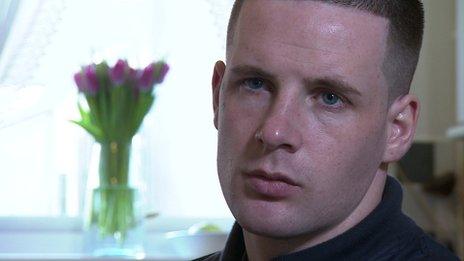
Shaun Lloyd has started campaigning on behalf of other IPP prisoners
He added: "If prisoners pose too high a risk of harm to the public, they can be kept in custody for the rest of their lives.
"The IPP scheme was complex and widely criticised, which is why the government replaced it with a new regime of tough, determinate sentences, alongside life sentences for the most serious offenders.
"However, we have no intention of retrospectively altering lawfully imposed IPP sentences - they were handed down for the most severe crimes, to ensure public protection."
- Published18 September 2012
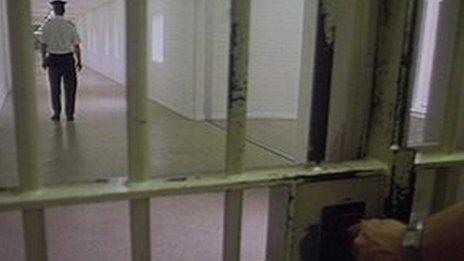
- Published3 December 2012
